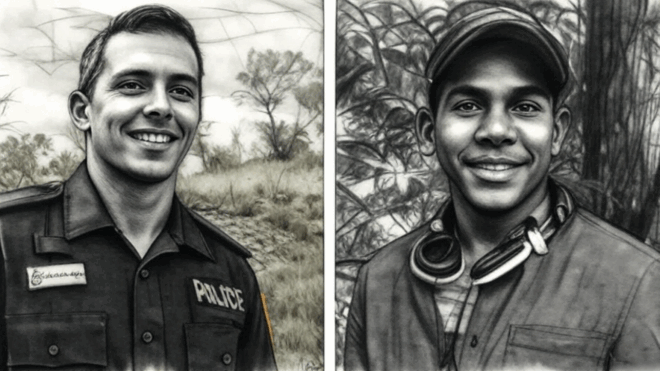
Abstract
The tragic death of Kumanjayi Walker, a 19-year-old Warlpiri-Luritja man, during a police operation in Yuendumu on November 9, 2019, has prompted a critical examination of policing practices and culture within the Northern Territory (NT) Police Force. Following the acquittal of Constable Zachary Rolfe, a coronial inquest led by NT Coroner Elisabeth Armitage revealed systemic issues of racism and excessive use of force within the police force. This paper explores the findings of the inquest, the implications for policing in Indigenous communities and the necessity for comprehensive reform in policing culture.
Introduction
The case of Kumanjayi Walker has become emblematic of the complex and often fraught relationship between Indigenous communities and law enforcement in Australia. The death of Walker, during a police operation, has raised profound questions about the adequacy of policing practices, the presence of systemic racism and the broader implications for community safety and trust. Following Constable Zachary Rolfe’s acquittal on charges related to Walker’s death, the coronial inquest revealed troubling patterns of behaviour and a culture within the NT Police that necessitates urgent reform. This paper aims to dissect the findings of the inquest, examining both the individual actions of Rolfe and the systemic issues that contribute to a culture of racism and excessive force.
Racism and Excessive FORCE: A Troubling Pattern
Coroner Elisabeth Armitage’s investigation into Constable Rolfe’s conduct unveiled a disturbing pattern of excessive force, particularly against Aboriginal individuals. A review of 46 prior use-of-force incidents involving Rolfe indicated a propensity for aggressive tactics. Evidence presented during the inquest demonstrated that Rolfe not only engaged in excessive use of force but also appeared to take pride in it. He shared videos of forceful arrests, indicating a troubling sense of exhilaration in confrontational situations. This behaviour raises significant questions about his suitability as a police officer and highlights a concerning attitude towards policing in Indigenous communities.
Moreover, the normalisation of racist language and attitudes within the Alice Springs police station emerged as a critical factor influencing Rolfe’s actions. Coroner Armitage stated, “I am comfortably satisfied that racist language was normalised within the Alice Springs police station during Mr. Rolfe’s time there as a police officer.” This normalisation of racism not only shaped Rolfe’s interactions with the Yuendumu community but also increased the likelihood of fatal outcomes during police encounters. Such findings underscore the urgent need for a comprehensive examination of the culture within the NT Police Force.
Institutional Racism: A Systemic Issue
The findings of the coronial inquest point to the existence of institutional racism within the NT Police Force, which significantly influenced Rolfe’s behaviour and decision-making processes. The evidence presented during the inquest included numerous allegations of a police culture that not only tolerated, but actively perpetuated racist attitudes and practices. This culture fostered a lack of accountability for officers, creating an environment where excessive use of force was deemed acceptable, particularly in interactions with Aboriginal individuals.
The systemic nature of these issues is reflected in the coroner’s recommendations, which total 32 and aim to address the deep-seated cultural problems within the police force. Key recommendations include a thorough investigation of the recruitment process to ensure that new officers align with values of respect and cultural sensitivity, as well as the establishment of community engagement initiatives designed to foster better relationships between police and Indigenous communities. Additionally, the proposal for a Yuendumu leadership group to facilitate mutual respect agreements represents a crucial step toward rebuilding trust and accountability between law enforcement and Indigenous populations.
The Path Forward: Challenges and Controversies
While the recommendations from the coronial inquest represent a significant step toward reform, the successful implementation of these changes remains uncertain. Historical resistance to change within law enforcement, combined with the complexity of addressing entrenched cultural issues, poses substantial challenges. The ongoing controversy surrounding the normalisation of racist practices within the police force complicates the discourse, with some defending the actions of officers as necessary for public safety. In contrast, Indigenous leaders and community advocates vehemently call for systemic reform.
The inquest findings underscore the urgent need for a cultural shift within the NT Police Force, one that prioritises accountability, transparency and respect for Indigenous communities. The tragic death of Kumanjayi Walker serves as a stark reminder of the consequences of unchecked racism and excessive force, highlighting the critical importance of addressing these issues to prevent future tragedies. This cultural reform is not only vital for the safety and well-being of Indigenous communities but also for the integrity and credibility of the police force itself.
The Role of Community Engagement
One of the critical recommendations from the coronial inquest is the establishment of community engagement initiatives aimed at fostering better relationships between police and Indigenous communities. Effective community engagement can play a pivotal role in rebuilding trust and accountability. By involving community leaders and members in discussions about policing practices and policies, law enforcement agencies can better understand the needs and concerns of Indigenous populations.
Community engagement initiatives can take various forms, including public forums, collaborative training programs and joint problem-solving efforts. These initiatives can help bridge the gap between police and Indigenous communities, creating opportunities for dialogue and mutual understanding. Furthermore, involving community members in the recruitment and training of police officers can ensure that new recruits are sensitive to the cultural contexts in which they will operate.
The Impact of Training and Education
Another essential aspect of reforming the NT Police Force involves enhancing training and education for officers. The inquest findings indicate a pressing need for comprehensive training programs that address issues of racism, cultural sensitivity and the appropriate use of force. Such training should not only focus on the legal aspects of policing but also on the social and cultural dynamics that influence interactions with Indigenous communities.
Implementing regular training sessions that include input from Indigenous leaders and cultural experts can help officers develop a deeper understanding of the communities they serve. Additionally, ongoing education about the historical context of Indigenous-police relations can foster empathy and awareness among officers, encouraging them to adopt more respectful and culturally sensitive approaches to policing.
The Role of Accountability Mechanisms
To ensure meaningful reform within the NT Police Force, robust accountability mechanisms must be established. The inquest findings highlighted a concerning lack of accountability for officers involved in excessive use of force and racist practices. Implementing transparent oversight processes, including independent review bodies and community representation, can help hold officers accountable for their actions.
Moreover, creating clear guidelines and protocols for the use of force, along with regular audits of police practices, can promote greater accountability within the force. Ensuring that officers are aware of the consequences of their actions and that there are mechanisms in place to address misconduct is crucial for rebuilding trust with Indigenous communities.
Conclusion
The coronial inquest into the death of Kumanjayi Walker has revealed significant and troubling insights into the behaviour of Constable Zachary Rolfe and the broader culture of the NT Police Force. Coroner Elisabeth Armitage’s findings point to a systemic problem of racism and excessive use of force that demands urgent attention and reform. The 32 recommendations provide a roadmap for change, but their success will depend on sustained commitment from both the police force and community stakeholders.
As we reflect on this case, it is imperative that we advocate for ongoing efforts to address systemic racism and improve policing practices in Indigenous communities. The tragic death of Kumanjayi Walker serves as a reminder of the consequences of unchecked racism and excessive force, underscoring the critical importance of fostering accountability, transparency and respect in policing. A comprehensive reform of the NT Police Force is not only necessary for the safety and well-being of Indigenous communities but also for the integrity and credibility of law enforcement as a whole. By embracing cultural reform, community engagement, enhanced training and robust accountability mechanisms, we can work towards a future where policing serves all communities equitably and justly.
References
1. ABC News. (2025). Kumanjayi Walker inquest findings.
2. Wikipedia. (2023). Death of Kumanjayi Walker.
3. The Guardian. (2022). Kumanjayi Walker court details.

